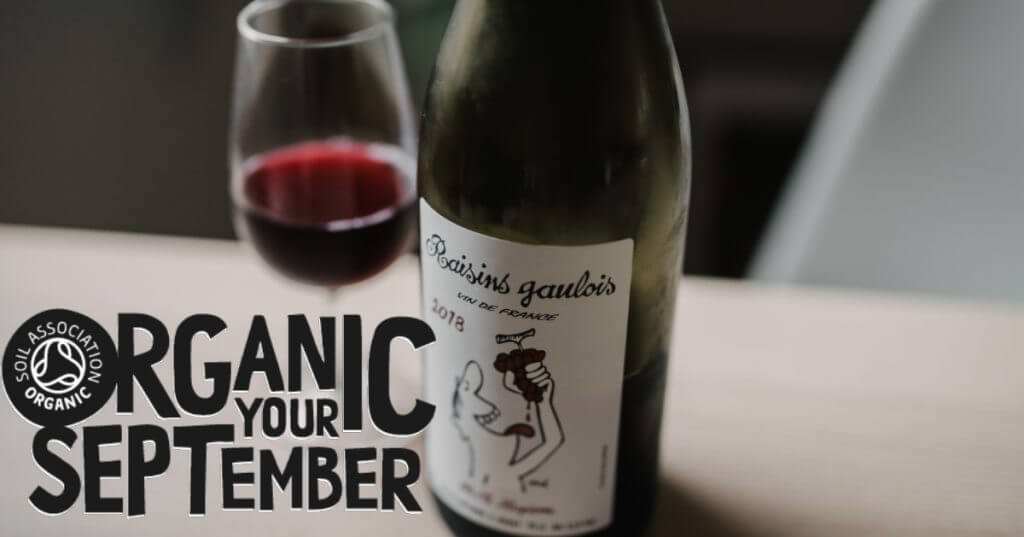Organic Wine, Wine World & Regions
Embrace Organic September With Organic Wine
It’s that time of year again folks, yup, it’s Organic September brought to you by Soil Association, and to get you into the mood for all things organic for the month ahead, we thought we’d give you a few reasons why organic is better than conventional.
We’re big supporters of all things organic here at PTC, all year round, but for those not in the know or new to the party, Organic September is the month long campaign designed to encourage consumers to try organic produce, as well as educate about organic food and drink and organic farming practices.
Because let’s face it, we are all in this together, there is no one designated leader, we kind of have to commit to changing the way we farm and feed our population for the sake of nature, wildlife and our planet.
Plus, this year has been a bumper year in the climate change debate and the role organic farming can play in shaping our future.
So, without further ado, what can you do to make a stand to protect the planet, create a healthier food and farming system, and eat and drink well in the process?
First, let’s bust some myths surrounding organic.
Organic myths
1. Organic is just a marketing gimmick
Really? This one is still being peddled? No, ‘organic’ is not a way for supermarkets and other retailers to charge shoppers a premium on their produce. Organic actually refers to the whole farming system, from the way the produce is grown, to the way it’s harvested. Organic is a way of farming harmoniously with nature, and to mark the importance of it, organic is in fact a legal certification.
2. Growing organically won’t sustain the global population
We call BS on this one too. Those who critisise organic farming methods bang on about reduced yields and the inability to fill all the mouths on this planet that need feeding. But with 1 billion people starving, 2 billion people overweight and ⅓ of all food never reaching our tables, yield is not the issue we need to be tackling here.
Because at the rate we are going, the current conventional system isn’t going to hold out much longer – for a start, soil degradation poses one of the biggest threats to our food security.
Looking at the bigger picture then the whole food system needs an overhaul – from distribution through to dietary education and food waste.
Organic can sustain the global population, if we rethink our consumption habits.
3. Organic is too expensive
Yes organic produce costs more than conventional produce, but stop and think why. What is the cost to the environment if you’re dead set on saving a few pennies by consuming wine made from grapes that have been sprayed to within an inch of their life with chemicals? Not to mention the cost to your health?
- Organic costs more because it takes extra time and consideration to produce in harmony with nature.
- Organic certification bodies charge a fee to certify products. Yes, this might seem like an unnecessary expense, but the money they make gets ploughed back into animal welfare, researching alternatives to pesticides and helping producers comply with the organic standards.
- The costs of conventional agriculture aren’t typically reflected in the cost of the food, unlike organic food. The hidden costs of conventional farming are instead paid for through taxes and water bills (for example) – where polluted waterways have needed cleaning up, or drinking water has needed treating to remove the chemical runoff from the pesticides sprayed on fields and vines.
The organic price tag may be higher, but the value for money you get in terms of promoting healthy ecosystems and the benefit to the environment as a whole, is incalculable.
Why eat and drink organic produce
- Organic produce contains fewer chemicals such as pesticides, fungicides, herbicides and insecticides. Conventional produce will have remnants of these chemicals on and in it. Discover all the benefits of low histamine wine .
- Organic produce tends to be fresher because it doesn’t contain the unnatural preservatives that conventional produce has to extend its shelf life.
- Organic farming is a better choice of agriculture for the environment.
- Organic produce is better for your health:
- Organic dairy contains 50% more omega-3 fatty acids
- Organic meat has lower concentrations of saturated fats
- Organic crops contain up to 68% more antioxidants
- Organic wine contains fewer chemicals – it’s free of synthetic additives, contains no GMOs, has no added sulphites (resulting in less intense hangovers) and is kinder on the environment
Learn more about what are sulphates and which role they have in producing wine. You may find something interesting when it comes to organic winemaking. After reading about sulphites you’d wish to know more about sulphate free wine, so we have just a perfect article for you.
Also, when it comes to sugar content in wine, organic wines have no added sugar only the one that is already in grapes.
What you can do to embrace Organic September
- Buy organic. The most helpful thing you can do is buy organic produce rather than conventional. By buying organic you will create a demand for it, resulting in a requirement for more organic farms to produce more organic food and drink.
- Support organic retailers. Purchasing organic wine from dedicated organic wine sellers is a start.
- Build an insect hotel in your garden. More than 40% of the world’s insect species are declining and ⅓ are endangered. The cause for their declining populations? Intensive agriculture and chemical pesticide use.
- Tell people that you’re opting for organic. One of the best ways to hold yourself accountable to anything is to tell other people what you’re doing. Not only will you feel beholden to follow through on your decision, but you might encourage friends and family to follow suit.
- Choose organic wine. Grapes are by far one of the most intensively sprayed crops on the planet due to their soft skin and predilection to moulds. By supporting organic vintners you are, in turn, supporting an organic farm that promotes biodiversity, that encourages wildlife rather than eschews it, and puts soil preservation at the forefront of their growing practices.

